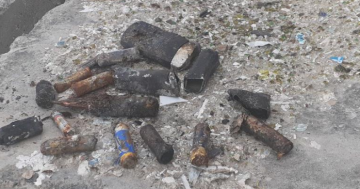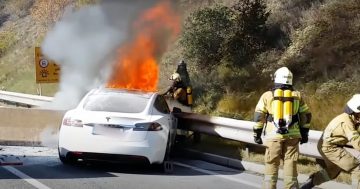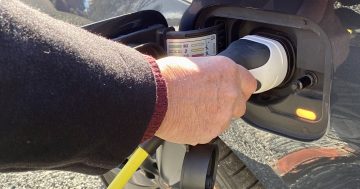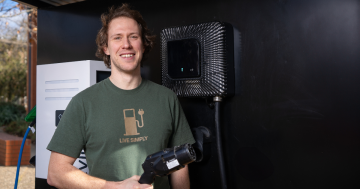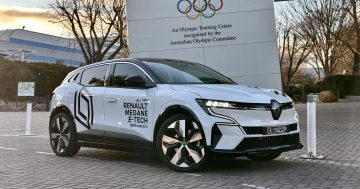
Two recent blazes in Fyshwick were linked to lithium-ion batteries. Photo: ACT Emergency Services Agency.
Two recent fires which took place at a lithium-ion battery storage and charging facility in Fyshwick have highlighted the simple fact that along with new technology comes new risks and challenges.
However, ACT Fire and Rescue Superintendent Matt Shonk isn’t complaining, and said the introduction of the batteries, which are often used in portable electronics such as smartphones, as well as electric vehicles and e-scooters, simply present new opportunities for learning for fire crews.
“Before there were cars, there were no car accidents,” he said, emphasising that all fire crews around Australia are going through the same learning process while trying to keep their people and crews safe.”
Superintendent Shonk said the increasing prevalence of lithium-ion batteries will make them a hazard for ACT Fire and Rescue crews “because there are just going to be fires” but their location and use will determine how they are treated.
Some people will have these types of batteries at their home in what’s called a BESS (Battery Energy Storage System) often mounted to a wall.
“When one of those catches fire, the results are generally the same as what we’d have in any other house fire so it’s treated the same as we would treat a house fire with the same products of combustion creating an atmosphere that’s not tenable for humans without breathing apparatus,” said Superintendent Shonk.
However, he explained it’s the treating of the actual source of the fire within the batteries that requires a different method, namely the consistent application of large amounts of water during a long period of time to reduce the heat inside the battery.
It’s believed lithium-ion batteries are able to retain heat for a considerable amount of time, which can lead to a reignition from the source, or even to smoke coming out weeks after an initial fire is thought to be put out.
Fire crews use a thermal energy camera to check the temperature of the batteries, and only once they have been restored to what’s considered an ambient temperature will they stop applying water.
The other challenge faced by fire crews is how to deal with such fires adequately without using up resources that might be needed elsewhere.
“It does require a risk assessment because there is a likelihood that firefighters will have to remain on the scene continually checking for a long period of time,” said Superintendent Shonk.
“We get it to a point where we consider it to be normal, and once it has been normal for a period of time, we consider the job done.”
Recently, fire crews were twice called to the same Fyshwick warehouse where e-scooter batteries were being stored. According to Superintendent Shonk, the reason for the second callout was that energy still in the batteries began to emit smoke and vapours. He did clarify it was not a reignition.
Back in 2017, lithium-ion batteries made headlines around the world because people’s phones were bursting into flames on aeroplanes without any apparent warning.
However, this is not a concern for ACT Fire and Rescue crews.
“Based on the evidence I have seen from sources such as the CSIRO and out of Sydney, if they are left in-situ in the right atmosphere they are not dangerous at all,” said Superintendent Shonk.
That’s not to say the batteries can’t go into what he described as ‘thermal runaway’.
“They can be mechanically damaged – say someone has hit one with a hammer, or they overheat,” he said.
“Batteries generally don’t get into either of those situations unless they are acted upon by humans.”
This should mean that with proper usage, batteries self-combusting should not occur.
Yet, Superintendent Shonk does put a caveat on that: this is only in the case of batteries that have been reliably manufactured.
“Those batteries that people order online from overseas with no warranties do concern me a bit more,” he said.
Superintendent Shonk explained that while the use of batteries in vehicles is well-regulated, this doesn’t happen for storage facilities.
“As far as the reliability of batteries in commercial storage goes, there are not many parameters set around that at the moment,” he said.












